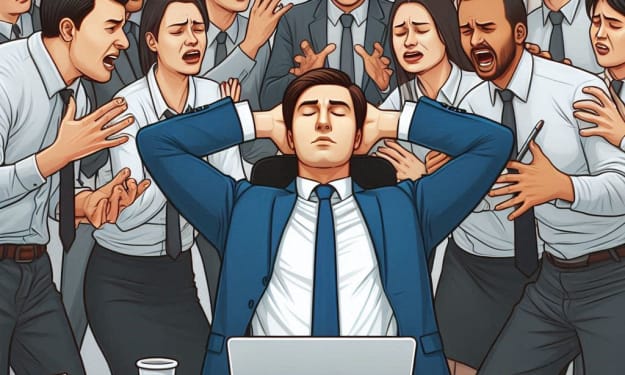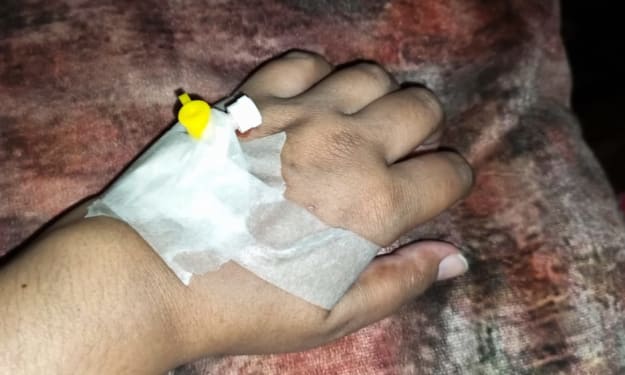
OCD is one of most common type of chronic mental illness. It is a long-lasting illness that causes the person uncontrollable, recurring obsessions that are very hard to maintain. This causes them to repeat the behavior over and over again without fail. "Obsessive-compulsive disorder (OCD) is a mental illness that causes repeated unwanted thoughts or sensations (obsessions)" (Fields, 2020).
This type of illness isn't a happy thing to live with. It's a really common thing that a person may want to check things once or twice in a while, but for the ones who have OCD may be paranoid and redo the whole thing over and over again. Such as having to watch hands in a specific number of times, repetitive thoughts on doing something and wanting things to be in a specific number and orders. Otherwise, the whole stuff may cause their mind to go racing over a million things and will not calm down, which can cause a real nightmare for those who have this disorder.
Symptoms
Before we go forward, let's see what the two - obsessions and compulsions - mean.
- "An obsession is an unwanted and unpleasant thought, image or urge that repeatedly enters your mind, causing feelings of anxiety, disgust or unease" (NHS, 2019).
- "A compulsion is a repetitive behaviour or mental act that you feel you need to do to temporarily relieve the unpleasant feelings brought on by the obsessive thought" (NHS, 2019).
It depends on a person on how severe their OCD is. Even though, the obsessions may not be something true or compulsions may not really do something to prevent the obsessions - these things cannot be helped and it is something that keeps bothering the people with OCD.
Obsessive symptoms
- Constant worry about small stuff.
- Intrusive thoughts, images or sounds.
- Need to have things in order, or in symmetrical order.
- Questioning things that don't have anything to do with their relationships or their actual way of lifestyle, such as suspicious of their partners, etc.
Compulsive disorders
- Doing things, a certain number of times
- Counting the number of stuffs, they have to keep them in a certain number.
- Rituals of having to be clean all the time
- Repeatedly checking on things to see if they are in the same place or order that they want, otherwise their mind will go feral.
Causes
It is not yet confirmed whether what causes OCD, but scientists are trying to figure out the cause for it. Some of the common believe for the cause of OCD is:
Genetics
If a first-degree relative experienced OCD as a kid or adolescent, the risk is increased. Current studies are investigating the link between genetics and OCD, which might lead to better OCD diagnosis and care. Studies on twins and families have revealed that those with first-degree relatives who have OCD—such as a parent, sibling, or child—are more likely to experience the disorder themselves.
Brain Structure and Functioning
Some studies done by scientists show that OCD individuals have different brain anatomy in terms of their frontal cortex and subcortical areas. Uncertainties in specific parts of the brain seem to be linked to OCD symptoms, although the relationship between the two is not yet fully understood. Serotonin levels that either abnormally low or brain activity patterns that are extremely high in certain OCD sufferers, as well according to studies made by psychiatrists.
Environment
Some researches have shown a link between childhood trauma and obsessive-compulsive symptoms. To properly comprehend this link, more study is required. There might be certain cases in the environment that causes the person to develop OCD. Some examples include stress, trauma, family problems, previous forms of abuse of the person as a child such as physical, mental, or sexual abuse.
There could be other risk factors or causes someone to develop OCD. These include -
- Depression, anxiety, and other mental illnesses may cause the person to develop OCD. It depends on the severity of the mental illnesses as well on how severe OCD is for the person.
- Life events - there may be many cases in a person's life that may leave them traumatized or have any stress related stuff going on in their life. It may be something related to genes, as discussed earlier, or a learned behavior as a child.
- Childhood acute neuropsychiatric symptoms (CANS) - OCD can abruptly start after an illness in some kids. PANDAS, or pediatric autoimmune neuropsychiatric disorders associated with streptococcus, is the name of the condition that follows a streptococcal infection. However, symptoms from other illnesses or infections might also appear.
Treatments
Medications
There are many forms of medication that can be used to treat OCD, or rather just reduce the symptoms of it. These include -
- Selective serotonin reuptake inhibitors (SSRIs), such as fluoxetine (Prozac) or sertraline (Zoloft).
- Antipsychotic drugs like aripiprazole (Abilify) or risperidone (Risperdal), which can enhance the effects of SSRIs,
- Memantine (Namenda), an NMDA receptor antagonist, which can also enhance the effects of SSRIs.
Therapy
- Cognitive behavioral therapy (CBT) - this form of therapy may help the patient with OCD in reforming their thoughts and change the thinking patterns a bit, therefore, helping in reducing the symptoms. Your doctor will place a person in an environment intended to induce anxiety or trigger compulsions as part of a technique known as exposure and response prevention. The person will be able discover on how to control their OCD behaviors by first learning to control them less.
- Exposure and response prevention (ERP) - includes gradually exposing oneself to dreaded scenarios or the worries that fuel one's obsessions or compulsions. ERP teaches patients how to control the suffering that obsessions bring about without reverting to compulsive behavior.
- Mindfulness-based cognitive therapy - this form of therapy helps with mindful techniques or coping skills that help with calming down the mind and reduces the chances of distress triggered symptoms.
Summary
Living with OCD is no easy task, whether it is your own family member or you yourself have the mental illness. However, if you do not get enough help or immediately, it may have a major impact on your lifestyle and the way you want it to be. Making it even worse for yourself and your loved ones. Reaching out to your loved ones is probably the best way to get emotional support and get help from professionals easier.
Treatment for OCD may take a long while, even your whole lifetime. But it is worthwhile, as through the medications and therapy suggested, it can reduce the likelihood of symptoms becoming too hasty. Professional may even suggest both combination of medication and therapy to help calm down the symptoms.
All in all, OCD may be cure-able with the lieklihood of just reducing the symptoms to help the person get back on track and live a healthy life. With the support given through the professionals and the loved ones, it is likely that the person may be able to overcome their obsessions or compulsions.
References:
Dorwart, L. (2022). Different Types of OCD: Symptoms and Examples. [online] Verywell Health. Available at: https://www.verywellhealth.com/different-types-of-ocd-5225252 [Accessed 5: Jul. 2023].
Robinson, D. and Raypole, C. (2021). Everything You Want to Know About OCD. [online] Healthline. Available at: https://www.healthline.com/health/ocd/social-signs#living-with-ocd [Accessed: 5 Jul. 2023].
NHS (2019). Overview - Obsessive compulsive disorder (OCD). [online] nhs.uk. Available at: https://www.nhs.uk/mental-health/conditions/obsessive-compulsive-disorder-ocd/overview/ [Accessed: 5 Jul. 2023].
Fields, L. (2020). What is OCD? [online] WebMD. Available at: https://www.webmd.com/mental-health/obsessive-compulsive-disorder [Accessed: 5 Jul. 2023].
National Institute of Mental Health (2019). NIMH Obsessive-Compulsive Disorder. [online] www.nimh.nih.gov. Available at: https://www.nimh.nih.gov/health/topics/obsessive-compulsive-disorder-ocd [Accessed: 5 Jul. 2023].
About the Creator
Enjoyed the story? Support the Creator.
Subscribe for free to receive all their stories in your feed. You could also pledge your support or give them a one-off tip, letting them know you appreciate their work.





Comments
There are no comments for this story
Be the first to respond and start the conversation.